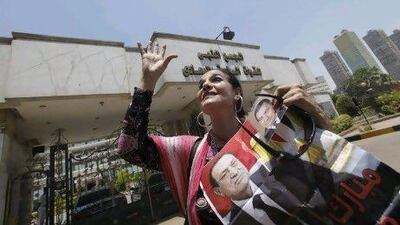CAIRO // The Egyptian media said Hosni Mubarak was in "nearly stable" condition yesterday after reportedly suffering a stroke and falling into a coma on Tuesday night, but that uncertainty served to exacerbate the tensions in the country's already fraught political transition.
Mubarak's health has deteriorated rapidly this month when he was sentenced to life in prison for his complicity in the killing of protesters during last year's uprising against his regime and brought to a hospital in Tora Prison on June 2. After the stroke, he was transferred to a military hospital in the Maadi neighbourhood along the Nile, according to the state news agency Mena, where 15 doctors were tending to his condition.
Rumours of the ousted president's demise spiralled across Egypt, fuelled by social networking sites, but yesterday officials were silent about Mubarak's status. The New York Times quoted a lawyer for Mubarak as saying that he was not on the verge of death and that he had actually slipped in the bathroom in the prison hospital, causing a blood clot in his neck.
The suspense over Mubarak's medical condition contributed to the tension over the results of the presidential elections, which are scheduled to be released today or over the weekend, and over the military's power grab after the Supreme Constitutional Court declared parliament should be dissolved.
Critics have described the subsequent constitutional declaration by the Supreme Council of Armed Forces (Scaf), which limits the role of the presidency and gives the generals control over the writing of a new constitution, as a "soft coup".
Mohammed Morsi, a prominent member of the Muslim Brotherhood, has declared himself the winner of presidential elections and a monitoring group run by judges has confirmed the results. The campaign of Ahmed Shafiq, Mr Morsi's only opponent and Mubarak's last prime minister, has said he was the winner.
The Supreme Presidential Election Commission said it would announce the results today, but state media Mena said yesterday the final results would be delayed, without giving a new date. Egypt’s election committee said it was still reviewing appeals from the two candidates
but an official was quoted this week by local newspapers as saying that the final results may be delayed because of appeals and investigations of voting irregularities. Mr Morsi's winning margin is about 900,000 votes, according to unofficial figures, which gave rise to speculation that there could still be a different result if enough votes are invalidated by the commission.
The Muslim Brotherhood, whose Freedom and Justice Party held nearly 50 per cent of the seats in parliament, has struck a more defiant stance toward Scaf after the generals assumed legislative power and control over the writing of the constitution. Tens of thousands of the group's members, along with a smaller number of revolutionary groups, demonstrated in Tahrir Square on Tuesday night against "military rule".
The next battle will be over the writing of a new constitution. How the country's charter is drafted will prove whether the Muslim Brotherhood and other political groups will be able to wrest control of the country from the military and how power will be distributed between the branches of government.
Mona Makram-Ebeid, a member of the civilian advisory council to Scaf, said that the generals were preparing to announce a new committee on Tuesday that would write the constitution.
The new committee will be made up of 100 members, as before, but there will be an emphasis on picking scholars and political figures rather than representatives of political parties, she said.
That would deal a serious blow to Islamist groups such as the Freedom and Justice Party and more conservative Al Nour Party, who used their parliamentary strength to obtain a majority of the seats in the old constitutional committee.
"We feel that the criteria should not be based on parties or ideology, but on merit and people who are considered by general consensus to be capable," Ms Makram-Ebeid said. "The Islamists have a lot of very good people among them, but we feel the members should not be chosen along party lines."
Ms Makram-Ebeid also said that the new president, whoever he may be, should only be in charge of the executive branch until after the constitution is written and voted upon in a referendum and new parliamentary elections. Her comments echoed those of Sameh Ashour, the head of the civilian advisory council to Scaf, that the president would only be in power for a matter of months.
The Muslim Brotherhood is fighting to reverse Scaf's decision to dissolve parliament by calling for a nationwide referendum on whether to implement the Supreme Constitutional Court's ruling.

